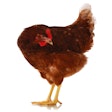In comments submitted August 31, the National Chicken Council (NCC) urged U.S. Environmental Protection Agency (EPA) Secretary Scott Pruitt to use the agency’s statutory general waiver authority to further reduce the total renewable fuel volume for 2018.
EPA on July 5, 2017, issued proposed volume requirements under the Renewable Fuel Standard (RFS) program for cellulosic biofuel, advanced biofuel, and total renewable fuel for calendar year 2018, proposing again to keep the mandated volume for conventional ethanol use for 2018 at the statutory maximum of 15 billion gallons. In proposing this level, EPA breached the 10 percent blend wall and will continue to subsidize the over production of ethanol, far in excess of the statutory maximum, which will divert corn from America’s food and feed use to foreign energy markets.
“As proposed, the RFS targets exceed the percentage of ethanol Congress envisioned being used in the fuel supply, create inappropriate artificial demand for corn in ethanol markets, incentivize inefficient overproduction of corn-based ethanol, and needlessly drive up corn prices for broiler chicken companies and other corn users who do not enjoy a large federal subsidy,” said NCC President Mike Brown in the comments. “NCC therefore encourages EPA to reduce conventional ethanol targets to a more appropriate level and to use EPA’s waiver authority to ensure that use of corn for ethanol remains balanced with other important uses, including in broiler chicken production.”
NCC also argued that a total renewable fuel volume of 19.24 billion gallons is not “reasonably attainable” as stated by EPA. By maintaining the 2018 RVO for conventional ethanol at 15 billion gallons, especially as total finished motor gasoline consumption is projected to decrease to 142.931 billion gallons, NCC said EPA continues to:
- Incentivize the overproduction of corn ethanol
- Lower available necessary E0 supplies
- Incentivize ethanol exports
- Exceed the envisioned cap on corn ethanol
- Impact corn use and price
- Impact the usage of other feedstuffs such as DDGS
- Impact RIN availability and value
Brown continued: “NCC strongly supports efforts to create a more reasonable and sustainable approach to the nation’s fuel policy. The compelled diversion of corn from feed to fuel uses exacts a heavy toll on the domestic chicken industry and American consumers. NCC believes the proposed volume for the total renewable fuel mandate is overly aggressive, based on faulty assumptions about the fuel market, and will cause economic harm and disruptions to the corn market and nation’s feed supply and thus should be reduced further in the final rule. NCC urges EPA to use its waiver authority to reduce the conventional ethanol targets under the RFS in a manner that better reflects the actual usage in the American motor fuel supply, avoids creating inappropriate artificial demand for corn used for ethanol, and minimizes pressure on input costs for other corn users, including the broiler chicken industry.”

















